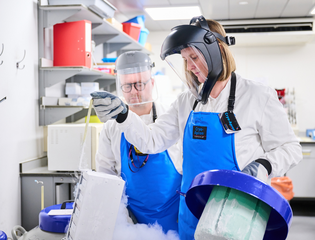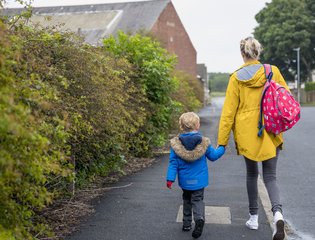How to explore your family history of cancer
At Ovarian Cancer Action we know how important it is to shine a light on the genetic faults (also known as mutations) that can run in families and raise a person’s risk of cancer.
Multiple cases of certain cancers in your family could be a sign that you are at higher risk. However, it can be difficult to piece together your family’s medical history and understand what it means for you. That's why we have put together some tips on exploring your family history - from how to start conversations with family members about cancer, to the signs that mean you could be eligible for genetic testing.
Your genetic risk
Every person has some risk of developing cancer and it’s now estimated that 1 in 2 people will be diagnosed in their lifetime. This risk may be higher or lower due to a mix of genetic, hormonal, and environmental factors. Family history can also increase your risk of cancer. The topic of cancer can be difficult to discuss and may be upsetting to some people. So how can you learn more about your own family history of cancer and learn more about how that history could affect you?
Starting the conversation
Families are diverse and may have different communication preferences, but genetic counsellors tell us they hear stories from patients about what has been helpful to them in starting the conversation about a family history of cancer. Many find TV or other media about cancer can be a good starting point. For example, ask your relatives if they have seen the section on morning TV about breast awareness, or maybe bring up that cancer charity bake sale in your workplace.
It’s also important to know your audience and the settings to have these conversations. Some families find themselves reminiscing about the holidays or at the dinner table. Family gatherings may be a good opportunity to ask questions about extended relatives. For others, one-to-one settings like a car ride or a walk can be a good time to discuss topics like this.
Exploring both sides of your family
Cancer risk can be affected by family history or specific cancer-risk genes that can be passed down, or inherited, in the family. There is a common myth that inherited causes of cancer are passed down the ‘female line’ but inherited cancer syndromes can have implications for everyone in a family and are just as likely to be passed down on your dad’s side too. It’s best to record all cancers on both sides at least back to your grandparents, or even their siblings if you can.

Alison with her daughter, Gaby
Alison, who was diagnosed with ovarian cancer and found out she carrries a BRCA gene fault, told us:
“I knew a little about BRCA because of Angelina Jolie - but I had no idea that a father could pass both breast and ovarian cancer risk to their daughter.
It turned out that I was carrying BRCA1 mutation and that it had been passed down through my healthy 89 year old father! His sister had died of breast cancer and his mother also had cancer.
It was important to me to know where this fault came from so I could inform any family members of this flaw in our family and give them the choice of preventative surgery.”
What to look out for in your family history
We know that cancer affects 1 in 2 people in their lifetime so it is not uncommon to have some cases of cancer in your family. Many people who develop cancer will have no family history of cancer and most cases are not linked to a faulty gene that can be tested for.
However, some of them will develop cancer due to high-risk inherited causes (such as BRCA1 or BRCA2 gene changes).
Start by drawing out your family tree on both sides of your family, noting down the information you already know so you can work out any gaps you need to fill. Include as many family members as you can including people who haven’t had cancer.
Write down their name, their age (and age they died if they have passed away), and any medical information you may know. If they have passed away, note down if you know how they died, even if it wasn’t from cancer.
Some clues in your family tree that may suggest a possible inherited cause:
- People being affected at a young age – for example, ovarian cancer is less commonly seen below the age of 60
- The subtype of cancer if known– for example, the types of ovarian cancer classed as epithelial (serous/endometrioid/clear cell) or Sertoli-Leydig can be linked to an inherited cause
- Other types of cancer, like lung and cervical, are less likely to have an inherited cause
- Two or more people on one side of the family affected by the same cancer
- One person affected by two or more cancers
- A pattern of cancers in a family – for example, breast and ovarian cancer can suggest a BRCA1/BRCA2 genetic change, or relatives affected with bowel, womb, and ovarian cancer may suggest Lynch syndrome
- It’s also important to know that certain ancestry means you’re more likely to have inherited a faulty BRCA gene, so you should also note down if you find out anyone in your family tree is:
- Jewish
- from Greenland
- from Orkney/Shetland
What information is needed for a genetics assessment?
If you are referred to your local genetics team, they will do an in-depth assessment of your family history which will include looking at your family as a whole, not only the people who have had a cancer diagnosis.
To give the most accurate advice about cancer risk, genetic counsellors may need to confirm the types of cancer seen in the family.
For example, gynaecological and other abdominal cancers commonly get mixed up as stories pass through families. So, any documents you have, such as doctor’s letters, or death certificates, can be helpful.
If you don’t have these documents, try to find as many details as you can such as full names, date of birth, date of death, and any hospital relatives were treated.
What to do if you are concerned about the family history of cancer
You can use our Hereditary Cancer Risk Checker to find out whether your family history might mean you are eligible to be referred to discuss further.
The first place to go is your GP as they can assess whether you would be eligible to be referred for an assessment of your family history. Alternatively, if you have been diagnosed with cancer yourself, your treatment team should also be able to make a referral.
It can be very hard to find out your full family history in some situations, such as adoption, death of family members, estrangement or other family events that mean you cannot communicate with your blood relatives. If this is the case, speak to your GP or genetics team as they may be able to help find out some of the information.
Our Special Projects Manager Jo tells us about the process of researching her family history:
“It was actually quite tricky to start finding out about our family history. Firstly, it was a difficult conversation for my mum to have with her dad. They had already lost her mum to cancer many years before, so navigating that conversation was emotional. The next tricky bit was simply realising how many people on that side of the family had cancer, but it wasn’t common knowledge! We went from “well there’s one or two so we should probably have a look” to “Wow!” which was quite overwhelming. It was the first step in the journey that I’m really glad we went on.”

